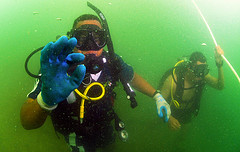 In a maritime emergency where the ship must be abandoned, the rules of Naval and Maritime tradition are as follows: passengers first, then the crew, and then the captain.
In a maritime emergency where the ship must be abandoned, the rules of Naval and Maritime tradition are as follows: passengers first, then the crew, and then the captain.
Why is the captain the last to leave the ship?
The reasoning behind the order of ship abandonment is that the captain is responsible for the passengers and cargo on the ship. In addition, legal title to a shipwreck hinges upon whether the owner has abandoned the vessel or not. Abandoned ships are fair game to treasure hunters and the first diver to take possession of the wreck typically gets to keep the bounty.
What constitutes abandonment depends on the particulars of the case, but typically a shipwreck has to be completely submerged for years with no attempt from the owners to salvage it before any court will declare it abandoned, but it’s unlikely that the Costa Concordia will ever be declared abandoned. First, much of the ship remains above water and second, the owners are making an active effort at recovery.
What will happen to the passenger’s sunken belongings?
More than 4,000 people fled the sinking ship and every one of them left behind what they brought on the boat: electronics, jewelry, clothing, and more. Â Salvage crews began to work on the capsized ship already and if marine engineers are able to right the ship and tow it to safety, the owners may be able to collect property from the cabins and return it to the passengers and crew.
That’s what happened when the Empress of the North, operating by Majestic America Line of Seattle, ran aground southwest of Juneau Alaska in 2007 (although the reports of passenger care and was far different than those coming from the passengers of the Costa Concordia). In that situation, passengers also left the ship with little other than their personal identification and medication, but they were reunited with their belongings later.
What can passengers expect from the Costa Concordia operators?
Unfortunately, in the situation of the Costa Concordia sinking, there’s likely to be a lot of lost and damaged property and passengers can file claims with the cruise line for their missing possessions, but most cruise tickets limit their liability for lost or damaged goods. The standard cap is $150 and these contracts specifically exclude any liability for cash and expensive items like jewelry and electronics.
Passengers without travel insurance are likely to be very disappointed in what they eventually receive for their belongings. The baggage coverage with a travel insurance plan will have limits on individual items and expensive items as well, but the policy limits are typically much higher than that offered by the cruise line.
In addition, if a traveler scheduled their electronics and other expensive items on their homeowner’s policy, they may have some option for reimbursement there.
